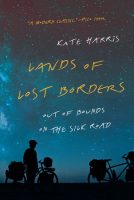 Lands of Lost Borders, Kate Harris’s account of cycling the Silk Road, went on sale in the United States last week after winning its author rave reviews in her native Canada. I hope we’ll soon be seeing it in Britain too. It’s given me more pleasure than most travel books — no: make that most books — I’ve read this year.
Lands of Lost Borders, Kate Harris’s account of cycling the Silk Road, went on sale in the United States last week after winning its author rave reviews in her native Canada. I hope we’ll soon be seeing it in Britain too. It’s given me more pleasure than most travel books — no: make that most books — I’ve read this year.
It’s a book about frontiers (a popular subject right now) and breaking through them. On the road, Harris, with her childhood friend Mel Yule, pedals to places where authorities don’t want her to go, including Tibet. On the page, she flits across supposed boundaries between travelogue and memoir, science and poetry. What she writes of Alfred Russel Wallace, the 19th-century British naturalist, applies equally well to herself: “His generative sense of wonder seemed to come from a refusal to specialise, to cultivate singular expertise at the expense of soul.”
Harris, who grew up in small-town Ontario, was intent at an early age on lighting out for the territory. Having read an abridged edition of Marco Polo’s travels at 10 or 11, she vowed to follow him when she grew up. When she reached her teens, however, the world seemed mapped and tamed, so she set her sights on becoming an astronaut. She went so far as to join scientists and engineers who were simulating missions to Mars in the Utah desert, and who kept “in sim”, spacesuits on, even when they went to the local grocer’s. After a fortnight in a bubble, she realised she was “homesick for my native planet”.
Having warmed up with a trip across the continental United States, she and Yule cycled the Chinese section of the Silk Road. Then, in between studying at Oxford and the Massachusetts Institute of Technology, Harris found the words of the young Charles Darwin ringing in her ears, urging her to “take all chances and to start on travels by land if possible, if otherwise on a long voyage”. So off she and Yule went again, cycling over a year from Turkey back to Tibet and on to the Siachen Glacier between India and Pakistan (“a place Polo didn’t actually visit but surely would’ve despised for its vastness, severity and glaring lack of marketable commodities”).
The result is a marvellous debut by a wanderer and wonderer, an author with boundless curiosity and a zest for life that enthuses every page. “I don’t just appreciate huge, head-clearing spaces,” she writes; “I need them like a crutch, the sort of hard contours I can grab onto and heave myself up with to behold the vastness out of which we came and to which we will all return.”
Writers are often counselled to travel alone, and that, as Steinbeck put it, “two or more people disturb the ecologic [sic] complex of an area”. Lands of Lost Borders demonstrates that that advice can sometimes be triumphantly ignored. The two cyclists don’t make a bubble of themselves; and Harris’s account of their friendship and how it works adds another strand to the book.
The copy I was sent by the author was a proof of the US edition, still bearing the odd literal and dangler. But the blemishes were minor. The strongest urge I felt on reading it was not to correct it but to go back and savour passages again, including this one:
Deserts have long been landscapes of revelation, as though the clean-bitten clarity of so much space heightens receptivity to frequencies otherwise missed in the white noise of normal life. This was especially true just before dawn on the Ustyurt Plateau, when the horizon glowed and shimmered like something about to happen. As the sun rose it tugged gold out of the ground and tossed it everywhere, letting the land’s innate wealth loose from a disguise of dust. The air smelled of baked dirt spiced with dew and sage. Our bicycles cast long cool shadows that grew and shrank with the desert’s rise and fall, its contours so subtle we needed those shadows to see them. The severity of the land, the softness of the light — where opposites meet is magic.
And this one:
We’re so used to thinking of nations as self-evident, maps as trusted authorities, the boundaries veining them blue-blooded and sure. In places like Tibet, though, the land itself gives those lines the slip. Borders might go bump in the night because they’re reinforced by guardrails, but also because they exist in only the most suggestive, ghost-like ways. At least that’s how I sensed them on the Aksai Chin — as a kind of haunting presence on horizons otherwise fenceless and patrolled only by wind. What if borders at their most basic are just desires written onto lands and lives, trying to foist permanence on the fact of flux?
I’m glad Harris has abandoned her interplanetary ambitions. We’re lucky to have her here on Earth.

Leave a Reply